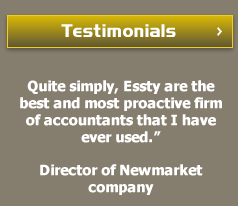April Question and Answer Corner
Newsletter issue - April 08.
Q. I am about to sell my VAT registered business as a going concern, but the buyer will not take on my VAT number so I will deregister for VAT. My business has been using the cash accounting scheme, so what happens to VAT received from customers after the date of deregistration?
A. Your final VAT return for your business must be completed on the normal accruals basis, not on the cash basis. You need to include all of the VAT that you added to your sales, or which has been charged on your purchases, and hasn't already been included in your previous VAT returns. The VAT on your sales invoices must be included even if those invoices have not been paid. Further details are given in VAT leaflet 731: Cash Accounting.
Q. I expect to make a taxable profit of £150,000 in my self-employed business in the year to 5 April 2008 and I've also made a capital gain of £65,000 in this tax year. Can I shelter these items from tax by making pension contributions?
A. The bad news is you only have until 5 April 2008 to make pension contributions to reduce the tax payable on your 2007/08 taxable profits. You cannot carry back pension contributions made in a later tax year to be set against income of an earlier tax year. You can pay pension contributions up to the limit of your taxable profits for 2007/08, subject to a cap of £225,000. The maximum you can actually pay is a net contribution of £117,000 (78% x £150,000). Your pension fund will then reclaim the basic rate tax of £33,000 (22% x £150,000), leaving a total gross contribution in your fund of £150,000. You cannot pay pension contributions to reduce the amount of capital gains that are taxed in 2007/08, but a large pension contribution could ensure your gains are taxed at the basic rate of 20% rather than 40%.
Q. My company has had a PAYE inspection and the Taxman said I must pay NICs on the telephone bills we pay for employees. Is this right and how can I avoid this extra expense in the future?
A. Where the employer pays a bill in the employee's name, such as the employee's telephone bill, the amount paid is treated as earnings and class 1 NICs are due. The costs that relate to business calls may be excluded from this value of 'earnings', but not the cost of the line rental. If the employer pays for a second line to be installed at the employee's home to be used exclusively for business calls, class 1 NIC is not due on the cost of those calls or line rental. So to reduce your NIC costs make sure the contract with the telecoms company is with your company as the employer.
 Cookies are small text files that are stored on your computer when you visit a website. They are mainly used as a way of improving the website functionalities or to provide more advanced statistical data.
Cookies are small text files that are stored on your computer when you visit a website. They are mainly used as a way of improving the website functionalities or to provide more advanced statistical data.










